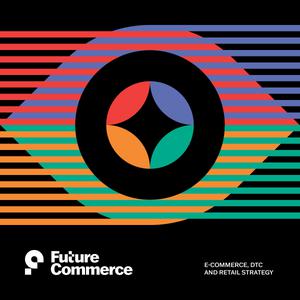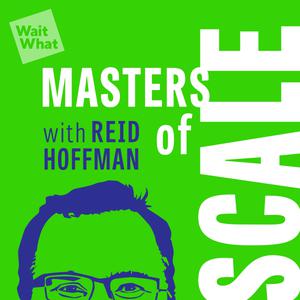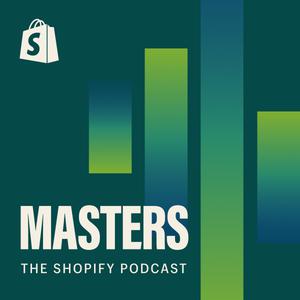
Future Commerce Podcast: eCommerce, DTC and Retail Strategy
Future Commerce
Future Commerce is the leading podcast for eCommerce and digital operators alike who aren't looking for the next conversion rate optimization tip or how to execute a playbook. It's for those who yearn for something deeper than CRO and PPC. Each week our hosts Phillip Jackson and Brian Lange explore what it means to sell or buy products online, and how commerce and media impact the culture and the world around us. Weekly essays, blogs, show notes, full transcripts, and quarterly market research reports are available at https://futurecommerce.fm
- 45 minutes 57 secondsPickleball and the Enthusiast Economy
The enthusiast economy drives purchasing trends in all areas of the economy—especially in sports, driving consumers to desire the same equipment as the best players. Premium pickleball apparel brand PB5Star is futureproofing by building a sustainable business model and systems during accelerating growth. Listen now!
PB5star and the Pickleball Phenomenon
Key takeaways:
- The enthusiast economy drives purchasing trends in sports, making consumers want the same equipment as the best players.
- Pickleball's rapid growth offers opportunities for brands to cater to players and enthusiasts beyond the sport itself.
- Building a brand requires patience, focus on core values, and understanding customers' needs and wants.
- PB5star aims to bring fashion, performance, and a cool vibe to pickleball while supporting players and contributing to the sport's growth.
- The sport's accessibility, community elements, and connection to wellness contribute to its rising popularity.
- PB5star is looking to expand into wholesale distribution channels, partnering with retailers to reach a wider audience while maintaining its direct-to-consumer presence. The brand founders emphasize patience, staying focused on core values, and being prepared to pivot as necessary to navigate the challenges of building a brand in an emerging industry.
- Shaping the future of pickleball will require investing in and supporting players who can help enhance the sport's growth.
- [00:03:36] "When you have the nerds of the sport sort of driving the outcome, a lot of the population will end up following a lot of that as they want to have the pieces of equipment that the best players are going to use and the best people in their community are going to use." — Brian
- Excerpt 2: [00:27:09] "If you work with good people who have good common sense, they have a great personality and good values at heart. They're the sorts of people we want to work with, and they're the sorts of businesses we want to work with as well." - Chris Gallagher, Founder of PB5star
Associated Links:
- Check out PB5Star and use code “SUPERSTARS” at checkout
- Check out Future Commerce on YouTube
- Check out Future Commerce+ for exclusive content and save on merch and print
- The MUSES Journal is here! Grab your copy of our latest annual journal today at musesjournal.com
- Subscribe to Insiders and The Senses to read more about what we are witnessing in the commerce world
- Listen to our other episodes of Future Commerce
Have any questions or comments about the show? Let us know on futurecommerce.com, or reach out to us on Twitter, Facebook, Instagram, or LinkedIn. We love hearing from our listeners!
26 April 2024, 11:00 am - 6 minutes 2 seconds*Teaser* IMMUNE TO ADS
Get ad-free episodes and bonus content, including the full recording of this podcast, by joining Future Commerce+ at futurecommerce.com/plus
- Save 15% on Future Commerce print journals and merch
- Private GPT access with BundleIQ
- Exclusive invites to physical events, dinners, and priority invites to industry events (SXSW, Art Basel, VISIONS)
- Ad-free episodes and bonus content!
24 April 2024, 11:00 am - 49 minutes 31 secondsBlink to Pay
Spatial commerce is all the rage thanks to the Apple Vision Pro… but are brands using it correctly? Phillip and Brian chat with a friend of the pod, Rob Petrosino, on the future of (spatial) commerce and digital twinning. Listen now!
Your home is the store of the future
Key takeaways:
- Spatial computing is nascent, with current devices being bulky and heavy. The form factor is a challenge for consumer adoption but has more immediate applications in specific industries like design and repair.
- The adoption of head-mounted displays for B2B use cases is likely to outpace consumer adoption due to cost considerations.
- Digital twinning is a crucial aspect of spatial computing, allowing for accurate 3D representations of physical products and spaces. This technology has potential in various industries like fashion, interior design, and personalized shopping experiences.
- AI plays a significant role in optimizing spatial experiences by offering predictive analytics, personalized recommendations, and conversational commerce. It accelerates the adoption curve by analyzing vast amounts of data to enhance user experiences.
- The future of commerce lies in combining physical spaces with digital experiences to create immersive shopping environments. Brands should focus on telling engaging stories through spatial design that involves narrative elements.
- The implementation of pay-with-biometrics technology in physical stores is a precursor to what might be possible in spatial commerce.
- In terms of current apps on Apple Vision Pro, there is room for improvement in providing novel experiences that are seamlessly integrated with fully-fledged ecommerce capabilities.
- {00:10:22} - “If you look at calculators, you had a massive computer that was the size of a room for a calculator. You had, you know, the evolution of the TI83, and now you have a calculator on your phone. You're going to see the same progression. We're at the biggest and worst the devices will ever be. It'll only get smaller, better, faster, which will increase adoption.” - Rob
- {00:17:21} - “Having that digital twin is really a massive form factor for these experiences because having a 360 degree experience around something is really where we are going when it comes to any experience, but specifically the commerce space.” - Rob
- {00:24:08} - “How do I combine {the physical and the digital} into a live experience using a magic mirror or a head mounted display or a personal device that kind of enhances that experience? So that's where I see the evolutionary path. And I think all of those are possible, and that's the leading indicator is you're starting to see organizations bring physical spaces into digital experiences.
- {00:29:49} - “The amount of data that we throw off in our digital footprints is exceptionally high. When you start plugging in artificial intelligence to that, it now gives a massive pool of data.” - Rob
- {00:43:55} - “It seems like the people that went to go build the first experiences maybe weren't perfectly aligned with the purchaser of the Apple Vision Pro. I feel like there's a huge opportunity. The Apple Vision Pro is one of the greatest signifiers of a type of buyer that has existed in the past 10 years.” - Brian
- {00:47:21} - “There might be a skew here that we just haven't picked up on yet where there might be an opportunity to reach a more affluent female crowd that we just haven't tapped into yet because we tend to think of tech adopters and early adopters as being older affluent males. So there's maybe also a little bias in the way that we think about how these things are being built.” - Phillip
Associated Links:
- Check us out on YouTube
- Learn more about Rob Petrosino and PeakActivity
- Check out Future Commerce+ for exclusive content and save on merch and print
- The MUSES Journal is here! Grab your copy of our latest annual journal today at musesjournal.com
- Subscribe to Insiders and The Senses to read more about what we are witnessing in the commerce world
- Listen to our other episodes of Future Commerce
Have any questions or comments about the show? Let us know on futurecommerce.com, or reach out to us on Twitter, Facebook, Instagram, or LinkedIn. We love hearing from our listeners!
19 April 2024, 11:00 am - 36 minutes 20 secondsPotential and Prodigy
Each season on Decoded, we demystify a nebulous concept in commerce. In this season of Decoded, presented by FERMÀT, Phillip sits down with Rabah Rahil, the CMO at FERMÀT, to examine the legacy of these prolific thinkers, inventors, and polymaths, philosophers, and mathematicians whose work inspired Steve Jobs, Jeff Bezos, and Bill Gates. One of these inspirations from the past is the mathemetician Srinivasa Ramanujan. Listen now!
The best time to be excellent, and the worst time to be average.
- {00:08:07} - “The first lesson we could learn {from Srinivasa Ramanujan} is becoming your own self-advocate, especially in your career, and understanding that maybe you have a talent and an intuition that can be useful for others.” - Phillip
- {00:10:12} - “Outside of an Ivy or if you want to go study under a professor, I think academia isn't a lot of times the path for you because I think a lot of times when you have these innate geniuses, if you would have taken them through an academic establishment, the creativity would have been beaten out of them. Because when you think of academics, it's very conformist.” - Rabah
- {00:13:50} - “I would rather hire people that have had a bunch of failures and pick themselves back up versus people that have never failed. Because I found those people that have never failed are candidly just quite soft.” - Rabah
- {00:17:05} - “Some truths look like universal laws in one context. But if you zoom out to a bigger context, the law doesn't hold true anymore. The law is broken from a different point of view.” - Phillip
- {00:24:38} - “When you lack conviction, you can be convinced that your intuition is wrong.” - Phillip
- {00:29:55} - “The cheat code of mathematics is it's cold and sterile, and there's usually a right answer. What we deal with is humans. Humans are insanely jagged. They flip from logic to emotion to logic to emotion, and there's going to be way more nuance in like, that's why marketing degree is an arts.” - Rabah
Associated Links:
- Learn more about Rabah Rahil and FERMÀT
- Ancient Aliens episode about Srinivasa Ramanujan
- Have you checked out our YouTube channel yet?
- Subscribe to Insiders and The Senses to read more about what we are witnessing in the commerce world
- Listen to our other episodes of Future Commerce
Have any questions or comments about the show? Let us know on futurecommerce.com, or reach out to us on Twitter, Facebook, Instagram, or LinkedIn. We love hearing from our listeners!
17 April 2024, 11:00 am - 1 hour 11 minutesAll Hail the Corporate Anniversary
Phillip and Brian discuss the forgettable nature of AI music. Corporations' birthdays are an essential thing that we need to care about now. Also, an update on Lammers Law: everything eventually becomes an ad. PLUS: OSHA for the MIND?? Listen now.
The Right to Disconnect
Key takeaways:
- Amazon is scaling back its Just Walk Out technology from its Amazon Fresh grocery stores. Due to technical limitations in grocery stores, it will be constrained to airports and small-format stores.
- JPMorgan's use of customer transaction data for targeted advertising highlights the increasing importance of personalized content.
- AI-generated music, such as that produced by Suno AI, may lack memorability but showcases the advancements in AI technology.
- The "right to disconnect" bill in California reflects the ongoing need for work-life balance in an increasingly digital world.
- Corporate anniversaries are becoming a popular marketing strategy and cultural celebration for brands.
- {00:11:41} - “People want the friction in their local community of chatting with their checker and chatting with people that are in line and living life in their community because they probably bump into people that they know, and it's part of their daily routine or their weekly routine or whatever to engage with the people in their communities as they go about doing their business.” - Brian
- {00:19:32} - “We all hate this idea, but the truth is that ads, good ads, and contextual ads add to a discovery mechanism in many platforms. Good ads heighten the experience of Instagram, I would argue. The good ads on Instagram make my experience of Instagram better. I think Instagram is a little bit worse if it has no ads because I discover things.” - Phillip
- {00:29:35} - “In my mind, this is as good as [AI music] will ever be. It doesn't only get better from here. Maybe the fidelity gets better. Maybe it can create stems. Maybe you can do more editing. Maybe you could go in and tweak things, and you'll have more creator tools, but it doesn't mean it gets more creative over time.” - Phillip
- {00:41:51} - “There's a really interesting amnesiac effect with this AI-generated music is it's incredibly forgettable. There's nothing remarkable or memorable about any of it. And I almost feel the same way about all AI-generated content. AI-generated art, AI-generated writing. There's nothing memorable or remarkable about it ever. The memorable thing is the discourse around it.” - Phillip
- {01:04:29} - “We are getting to a point now where we're hitting Norbert Wiener's prediction around "the world of the future will be an even more demanding struggle against the limitations of our intelligence, not a comfortable hammock in which we can lie down to be waited upon by our robot slaves." What we're bumping up right now against is pushing our minds further as far as they possibly can go, and there's a lot of burnout that's happening as a result.” - Brian
Associated Links:
- Check out Future Commerce+ for exclusive content and save on merch and print
- The MUSES Journal is here! Grab your copy of our latest annual journal today at musesjournal.com
- Have you checked out our YouTube channel yet?
- Subscribe to Insiders and The Senses to read more about what we are witnessing in the commerce world
- Listen to our other episodes of Future Commerce
Have any questions or comments about the show? Let us know on futurecommerce.com, or reach out to us on Twitter, Facebook, Instagram, or LinkedIn. We love hearing from our listeners!
12 April 2024, 11:00 am - 52 minutes 15 seconds“Total Eclipse of the Cart"
There are fewer places for kids to be kids, and there are more places for kids to parrot the behaviors and consumer preferences of the adults. This intergenerational response to culture is affecting commerce… and vice versa. Join Brian and Phillip on this special lunar edition of Future Commerce, which turns into something even more *eclipsing*.
How Media Shapes Our Buying Decisions
Key takeaways:
- Mimesis plays a significant role in shaping consumer trends, particularly among children who mimic their parents' brand preferences.
- Multigenerational marketing is becoming increasingly important as brands strive to appeal to both adults and children in the same market.
- Media has a direct impact on consumer behavior and brand preferences, as media cycles drive discourse and influence purchasing decisions.
- Predictable growth rather than exponential growth should be a primary focus for businesses seeking long-term success.
- The trend cycles are influenced by an inciting event, followed by discourse, backlash, and ultimately a potential counterpunch or shift in attention.
- {00:13:40} - “Part of the consumer education of a child has changed dramatically since the closure of Toys R Us. So I grew up in a world where there are a lot of independent toy stores or game shops, or there were franchised models of those. These were places where you could go that had very specific merchandising that was literally just for me as a kid, and it was the endless aisle.” - Phillip
- {00:19:13} - “You look at the Sephora Kids trend as an overarching reflection that there is a strong agreement between both older generations and younger generations about what is interesting, what's trending, what's cool, things that are exposed to different audiences, but native to those audiences in their media channels. So whether it's short form video or it's social share or messaging between friends, kids are parroting what their parents are doing…which I would say is a new form of monoculture.” - Phillip
- {00:25:54} - “One of the dangers of marketing to children is there is something that happens in this mimesis process where kids, when they become a certain age, want to reject the things that they did when they were children.” - Brian
- {00:35:39} - “The lesson to take away is that world-building has a huge effect on what we buy, and there are a lot of people out there who believe that all this stuff doesn't matter to commerce, but I think that's the whole charter of why we've made Future Commerce.” - Brian
- {00:36:26} - “There are a lot of ways that people and consumers expect brands to participate in the cultural discourse now, and we have to merchandise at the speed of culture. That is the job and in particular, eCommerce can move that fast. So it's expected that we do.” - Phillip
- {00:42:19} - “There's going to be some level of disgust that happens at some point in that mimetic cycle. And then you've built up production and you've pursued this strategy for so long and it's going to disappear overnight. And I think the job of businesses isn't necessarily to grow. The job of businesses is to be predictable {in that growth}.” - Brian
- {00:45:01} - “The same thing happens with viral product trends. There's an inciting incident that creates a discourse and then there's a backlash. What happens is for it to exit the trend cyclical nature, for us to exit that, there has to be a backlash to backlash.” - Phillip
Associated Links:
- Check out Future Commerce+ for exclusive content and save on merch and print
- The MUSES Journal is here! Grab your copy of our latest annual journal today at musesjournal.com
- Have you checked out our YouTube channel yet?
- Subscribe to Insiders and The Senses to read more about what we are witnessing in the commerce world
- Listen to our other episodes of Future Commerce
Have any questions or comments about the show? Let us know on futurecommerce.com, or reach out to us on Twitter, Facebook, Instagram, or LinkedIn. We love hearing from our listeners!
5 April 2024, 11:00 am - 1 hour 16 minutesThe Endless-ish Aisle
Phillip and Brian have FOMO over guerrilla marketing in the *bathroom*, and break down the Jackson family walkthrough of Meow Wolf’s Omega Mart. Stick around for BigCommerce CEO Brent Bellm’s sit down with Brian live from Shoptalk.
“From $70M to $700M”
Key takeaways:
- ShopTalk has become the biggest pure-play event in North America for e-commerce, showcasing the growth and optimism in the industry.
- AI is making its way into various tools and solutions, embedding Gen AI to increase efficiency in teams.
- TikTok is seen as a viable platform for brands to engage with new audience segments, and it offers a unique opportunity for creators to collaborate with brands.
- Checkout replacement tools are shifting gears, aiming for faster and more adaptable solutions to meet the evolving needs of e-commerce businesses.
- Omega Mart by Meow Wolf is an immersive art exhibit that satirizes capitalism and consumerism, allowing visitors to explore a surreal grocery store with twisted products on the shelves.
- {00:15:41} - “There are a lot of solutions that are actually embedding Gen AI in their tools. Everything from data cleanliness to customer service to product copy to marketing and other tools. I think everyone's just barely actually embedding it in a way that will actually increase efficiency in teams.” - Brian
- {00:27:15} - “{TikTok Shop} is closer to almost like a B2B2C model. You have your home designers and fabric stores sell to those home designers and they work their fabrics into the homes that they're influencing. It's almost the same thing. Managing these effectively, you know, designers for all kinds of experiences, not just homes, but beauty, fashion, whatever it is.” - Brian
- {00:52:47} - “The overarching philosophy of metamodernism in that the best way to deliver an experience is to engage in both culture and commerce but to do so with a wink to say, "We both know that for this thing to exist that you really want that I have to play into the commercial nature of the way that it exists. And so I will critique that so that you can't critique it, Mrs Consumer. I will critique it for us, but we both know that the only way that you're going to get this and the only way you can deliver this and experience this is if it's commercialized in some way," and that is the overarching narrative of Omega Mart.” - Phillip
- {00:59:15} - “You can press a button and have a catalyst store on Next.js and React, the highest performing most popular tech in the world of composable, in under 60 seconds pre-integrated with all of our functionality, as well as leading content management solutions, as well as leading search and merch engines, out of the box hosting from top partners like Vercel. We have so lowered the bar to the world's best composable tech that we think that's the future, and it's perfectly timed with the growth again of MACH enthusiasm in the US.” - Brent
- {01:07:21} - “What if we turned Makeswift, not just for content websites, which is what it was built for, into commerce websites too? And that was the sort of the magic aha idea, and I think we are going to transform the industry.” - Brent
- {01:13:29} - “We're open sourcing the React component library. Meaning, any agency, any developer can come in and contribute a new component or enhance a component. We'll make sure it's secure. We'll be sort of the gatekeepers on the quality, but you're not dependent just on the components that BigCommerce builds. Anybody can be building new extraordinary website components that go into the library and make it that much more powerful to leverage that library.” - Brent
Associated Links:
- Check out Future Commerce+ for exclusive content and save on merch and print
- The MUSES Journal is here! Grab your copy of our latest annual journal today at musesjournal.com
- Have you checked out our YouTube channel yet?
- Subscribe to Insiders and The Senses to read more about what we are witnessing in the commerce world
- Listen to our other episodes of Future Commerce
Have any questions or comments about the show? Let us know on futurecommerce.com, or reach out to us on Twitter, Facebook, Instagram, or LinkedIn. We love hearing from our listeners!
29 March 2024, 11:00 am - 35 minutes 57 secondsThe Future of Brand Activations feat. Paola Pugliese, Frette
“Customer obsession” is an overused phrase. But for Frette, it just might be true. Phillip and Brian sit down with Paola Pugliese of Frette to discuss heritage luxury, DTC-specific category extensions, and the future of brand activations at cultural events. Recorded live at eTail West.
“Quiet Luxury is Not a Trend”
Key takeaways:
- The power of consumer demand has grown, with brands needing to be true to their values and work closely with customers for relevance and delight.
- Frette focuses on partnerships with select partners, such as hospitality properties and designers, to ensure their products land in the right environments.
- Quiet luxury is inherent to Frette's DNA, focusing on quality, heritage, and timeless design rather than logo branding.
- Brand partnerships expand brand reach and offer opportunities for exclusive experiences and collaborations that go beyond just selling products.
- {00:08:12} - “You have to be true to your value and really work with your customers firsthand and understand what is the best way, as I said, to serve them, to also delight them, surprise them, and keep being, in a way, present in their daily lives.” - Paola
- {00:11:23} - “For a luxury brand, especially, services are fundamental. And there's no better way to design your next relevant service or product than actually asking the people that are going to use it.” - Paola
- {00:14:56} - “When you really have the same vision about the importance of the experience of the customers and the way you want them to enjoy the product, then you can also create interesting partnerships that go beyond just selling the product.” - Paola
- {00:25:38} - “Quiet luxury in itself is not a trend, buzzword. We were there before. We are gonna be there after. What is gonna speak for us is forever the quality, the heritage, what we stand for. And that is always going to be the best value for us.” - Paola
- {00:29:19} - “I love what you're saying about brands being the new muses, which is also building on the fact that brands need to have an opinion and share the values, and executives need to put their face after what the brand stand for. So we start with what might be interesting and relevant for the customers.” - Paola
Associated Links:
- Learn more about Frette and Paola Pugliese
- Check out Future Commerce+ for exclusive content and save on merch and print
- The MUSES Journal is here! Grab your copy of our latest annual journal today at musesjournal.com
- Have you checked out our YouTube channel yet?
- Subscribe to Insiders and The Senses to read more about what we are witnessing in the commerce world
- Listen to our other episodes of Future Commerce
Have any questions or comments about the show? Let us know on futurecommerce.com, or reach out to us on Twitter, Facebook, Instagram, or LinkedIn. We love hearing from our listeners!
22 March 2024, 11:00 am - 9 minutes 55 seconds*Teaser* NEVER GO FULL MOANA
Get ad-free episodes and bonus content, including the full recording of this podcast, by joining Future Commerce+ at futurecommerce.com/plus
- Save 15% on Future Commerce print journals and merch
- Private GPT access with BundleIQ
- Exclusive invites to physical events, dinners, and priority invites to industry events (SXSW, Art Basel, VISIONS)
- Ad-free episodes and bonus content!
18 March 2024, 11:00 am - 45 minutes 1 secondThe Nerds Will Save Us
For FACEGYM, what is the multiplayer future? What are those incentives, and what do customers want in return? PLUS: A teardown of Web3 as it enters the slope of enlightenment. Listen now and join the discussion!
“What does ‘better’ mean?”
Key takeaways:
- Web3's potential for mass adoption is still hindered by regulatory conditions and technical barriers, but a breakthrough use case could emerge with advancements in technology.
- Purpose and values are fundamental in connecting with customers and building brand loyalty in today's market.
- Deepening relationships with localized communities and empowering creators can help brands create more meaningful connections with their customers.
- Decentralized ownership and collaborative multiplayer experiences offer new possibilities for brands to engage their audience.
- Niche communities are becoming increasingly important, allowing brands to embrace fragmentation and connect with specific audience segments for more authentic brand building.
- {00:10:08} - “A lot of people in Web3 were looking to Web3 as a solution, but actually, the same problems still present themselves. A lot of what I find is that we're just using new words to talk about the same things.” - Alexa
- {00:16:02} - “Whatever happens in the future, whatever technology winds up underpinning, it's going to take more consumer adoption to make any technology pervasive and ubiquitous, and that's what any technology needs to be able to survive.” - Phillip
- {00:22:36} - “When you give customers, certain kinds of customers for certain brands, maybe not every brand, the tools of creativity where they can now reimagine the things that you're making in a way that they think is more powerful or more emotionally resonant, that becomes very disruptive for all industry. That's the scary thing.”
- {00:22:56} - “What brands are missing is the methodologies and the toolset to pick up and give those people that are ready to raise their hands a way to engage in a really meaningful way.” - Brian
- {00:26:09} - “What is better is always the question, and that's where I think you bump into challenges where different people have different visions for what better means, and I've definitely seen that cause problems.” - Brian
- {00:27:07} - “Community has become such a buzzword, but community at scale is actually quite difficult to achieve in a meaningful way. And so then you end up watering down your incentives to kind of like the minimum viable incentive set, and then you're actually not really achieving what you set out to achieve.” - Alexa
- {00:40:52} - “I don't want to say that brands have no responsibility to their customers or to the world that they live in. I think that they do have responsibility. I think that we ask more and more and more of them over time because of the failings of other parts of our society that are not working the way that they used to. Or maybe we romanticize the past.” - Phillip
- {00:43:34} - “Instead of your brand being what you say it is, your brand is what someone says about it to their closest friend.” - Alexa
Associated Links:
- Learn more about Alexa Lombardo, Atomic Number 8, and FaceGym
- Check out Future Commerce+ for exclusive content and save on merch and print
- The MUSES Journal is here! Grab your copy of our latest annual journal today at musesjournal.com
- Have you checked out our YouTube channel yet?
- Subscribe to Insiders and The Senses to read more about what we are witnessing in the commerce world
- Listen to our other episodes of Future Commerce
Have any questions or comments about the show? Let us know on futurecommerce.com, or reach out to us on Twitter, Facebook, Instagram, or LinkedIn. We love hearing from our listeners!
15 March 2024, 11:00 am - 25 minutes 41 secondsTikTok Shutdown: "Platforms Represent Both Opportunities and Risk" (feat BK Beauty)
Breakout brand BK Beauty’s co-founders, Lisa and Paul Jauregui, discuss the potential consequences of a TikTok shutdown on the eCommerce landscape. While many brands use TikTok Shops as a growth channel to reach new audiences, the House passing a bill to shut down ByteDance's operation in the United States has sent shockwaves through the industry.
14 March 2024, 6:17 pm - More Episodes? Get the App
Your feedback is valuable to us. Should you encounter any bugs, glitches, lack of functionality or other problems, please email us on [email protected] or join Moon.FM Telegram Group where you can talk directly to the dev team who are happy to answer any queries.
 Masters of Scale
Masters of Scale
 My First Million
My First Million
 eCommerce Fuel
eCommerce Fuel
 a16z Podcast
a16z Podcast
 Shopify Masters | The ecommerce business and marketing podcast for ambitious entrepreneurs
Shopify Masters | The ecommerce business and marketing podcast for ambitious entrepreneurs
 The Twenty Minute VC (20VC): Venture Capital | Startup Funding | The Pitch
The Twenty Minute VC (20VC): Venture Capital | Startup Funding | The Pitch